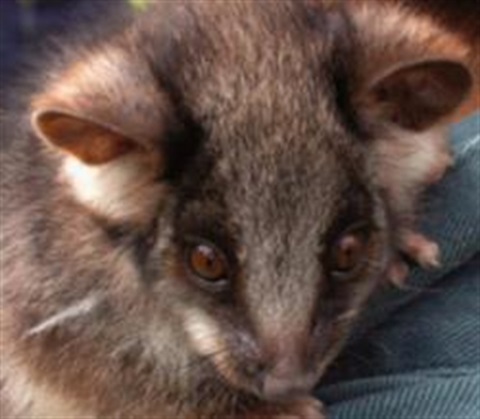Possums

The City of Burnside acknowledges that possums are prevalent in the Burnside area and they can cause significant distress to some residents. Possums are native to this area and we would like to find ways to live harmoniously together. Although possums may cause disruptions when they decide to inhabit your property, they are not unmanageable. The City of Burnside offers the following solutions to residents.
Image: Natural Resources Adelaide and Mt Lofty Ranges.
Possum Nest Boxes
The clearing of Adelaide’s original bushland has resulted in the loss of natural nesting hollows in old trees.
We can mimic natural hollows by installing nesting boxes to help provide possum homes and deter them from living in roof cavities by supplementing naturally occurring hollows with nesting boxes, providing native food plants and retaining vegetation corridors you are sustainably supporting these extraordinary suburban neighbours.
When installing a nest box remember to locate it high enough to avoid threats from dogs, cats, rats and foxes (4 - 8 m), but still at a height where the box can be maintained. The box entrance needs to face away from the hot sun, and also positioned to avoid the wettest winds. Positioning an artificial hollow under a leafy canopy will also provide natural shade.
Private Contractor Services
If you can’t adequately control possums on your property, we recommend you contact a professional pest contractor.
Pest controllers providing a possum removal service require a permit from the Department for Environment and Water. This permit grants approval for a pest controller to trap and release possums on behalf of the landholder onto the landholder’s property within 50 metres of the capture site. Ask the pest controller to show you a copy of their permit or ask for their permit number.
Possum Cages
Possum cages allow for the removal of possums from your roof cavity so that you may block up access points. Once a possum is trapped it is illegal to remove it from your property and therefore must be released back into your property, within 50 metres of the capture site, within 24 hours. It is also illegal to trap possums without a permit.
Possum cages are available for hire from the City of Burnside for a maximum period of 14 days. A current permit to Trap and Release Protected Animals must be uploaded to your booking in order to hire a possum cage.
A permit form the Department for Environment and Water. Please note that permit applications must be sent to the Department for Environment and Water for processing, they cannot be processed by council staff.
Refer to Fees and Charges and Animal Trap Hire Terms and Conditions(PDF, 126KB).
Cage Hire
Further information
Injured or Orphaned Possums
Contact the Fauna Rescue of SA Inc. 24 hour Wildlife Volunteer Helpline on 8289 0896 for advice or visit their website Fauna Rescue of SA Inc.
For further information, please contact the Customer Service Centre on 8366 4200.
Decline in Possum Numbers
The Department for Environment and Water has identified that the Common Brushtail Possum has suffered a significant decline in abundance and reduction in its range across South Australia and suspects that these trends are continuing.
Habitat clearance and the long term effects of fragmentation is the greatest threat facing these and many other native species. Within highly modified environments such as the suburbs, other threats include introduced predators (dogs, cats and foxes), motor vehicles, electrical transformers atop stobie poles and a lack of natural hollows. A number of these situations can bring residents into conflict with possums, particularly the Common Brushtail Possums. Responsible pet ownership can help to reduce conflict with possums.
Ensuring dogs and cats are confined overnight (in secure runs or inside) is safer for possums as well as the pets. This will also reduce the level of noise associated with any nocturnal visits.
The availability of food is one of the principal reasons for possum densities becoming higher in some urban locations. This tends to happen in city parks and gardens where the animals are artificially fed or have access to the organic waste we discard.
The Common Brushtail Possum has suffered a significant reduction in its range across South Australia. Possums are territorial and studies have found that possums released into another possum’s territory usually die within a few days due to stress, fighting and starvation. Relocating possums may also spread disease if the animal is sick.
Possums have declined in regional areas as well due to fox and cat predation, habitat fragmentation through urbanisation and other land management practices. There has also been the loss of suitable refuge sites and natural food sources. Australia has lost many of its native animals through habitat destruction and disease.
For more information please visit the Department for Environment and Water website.